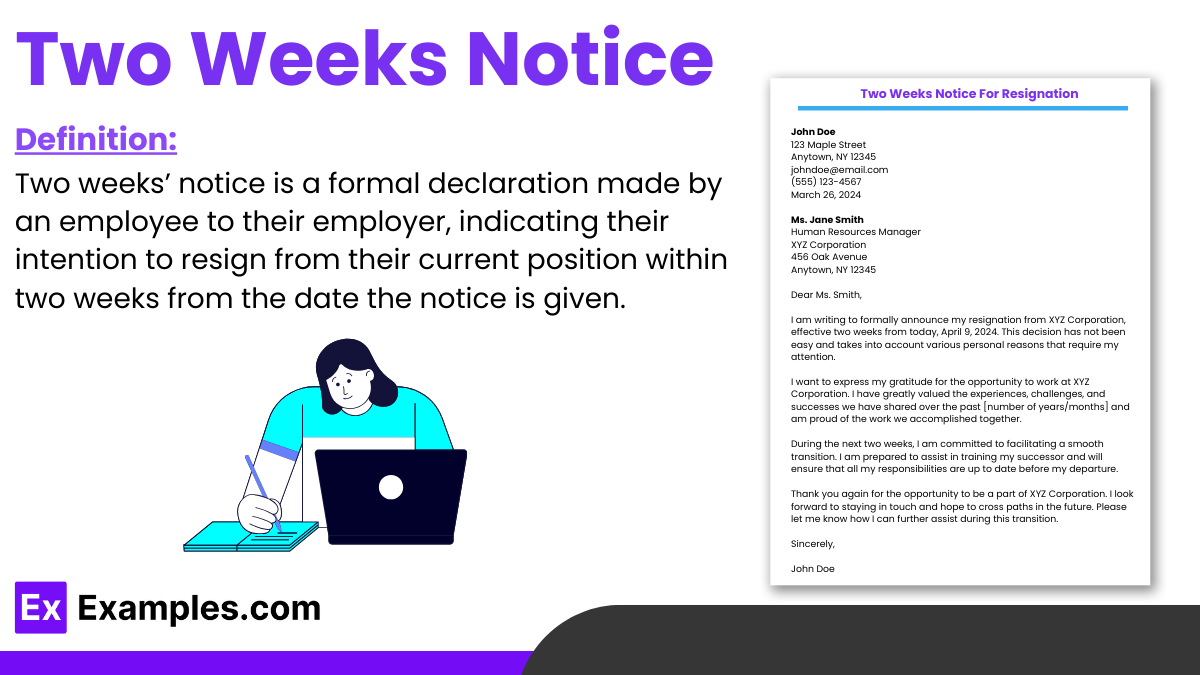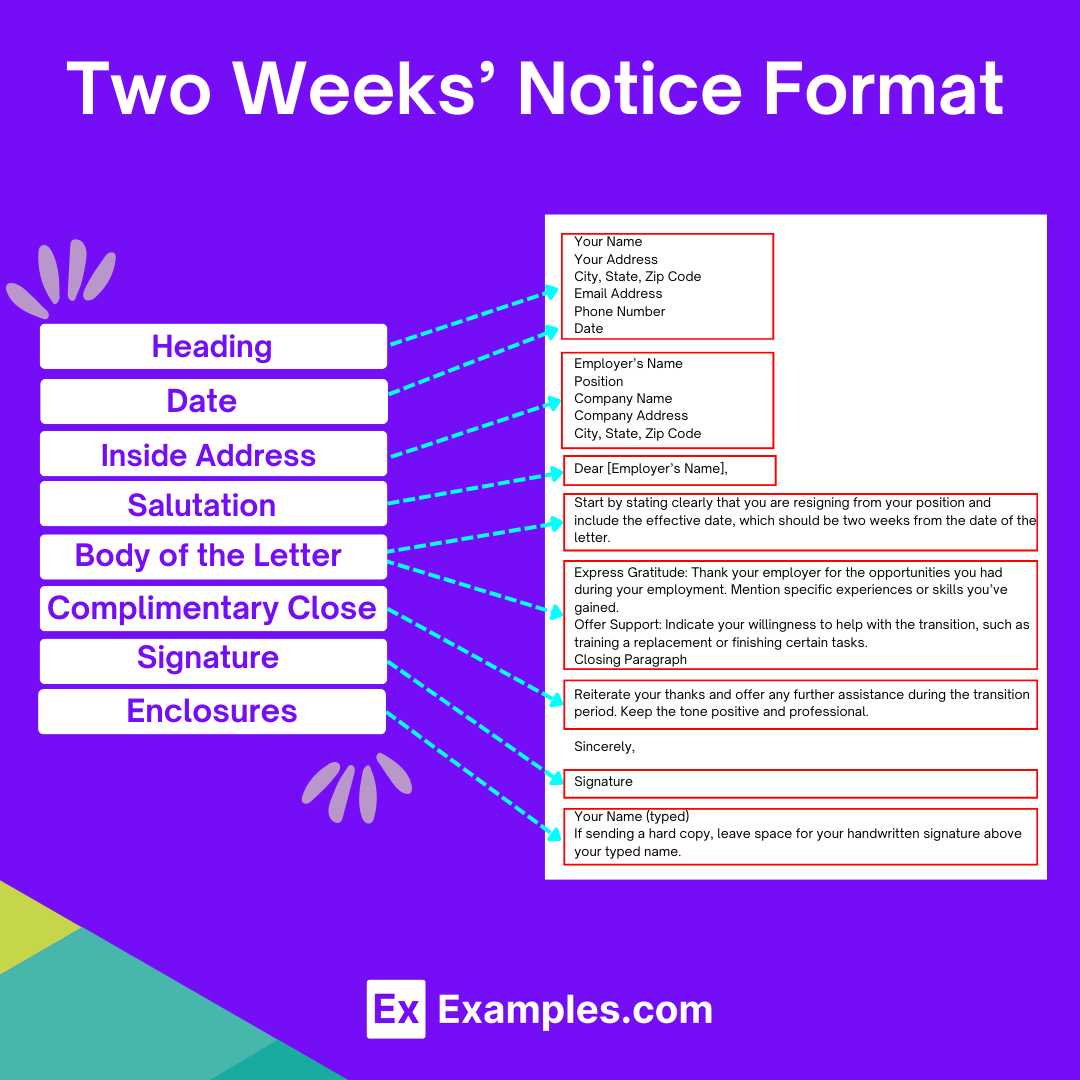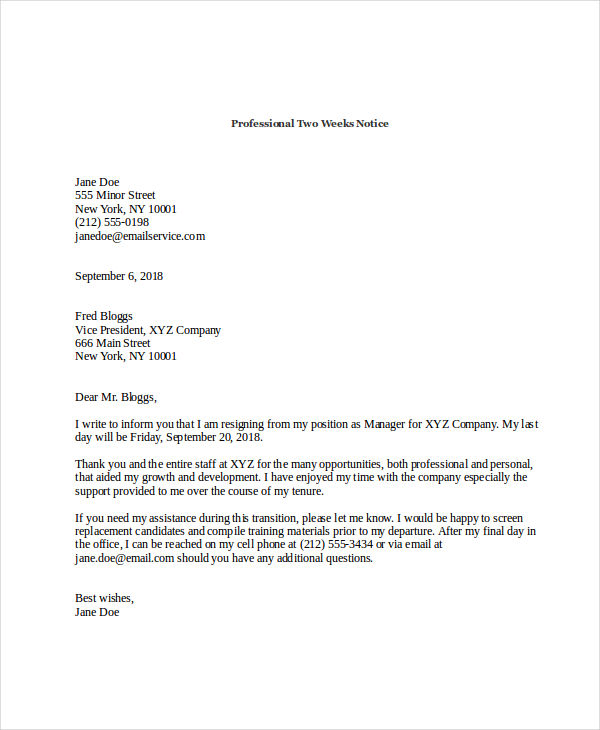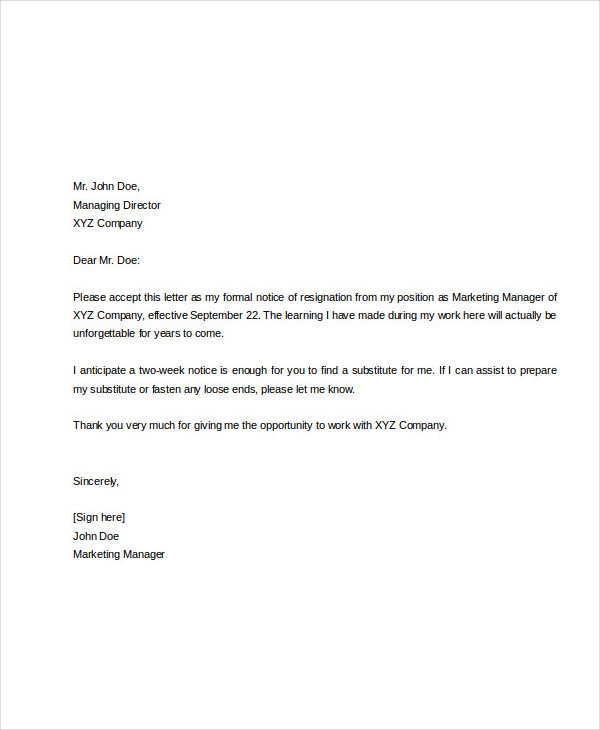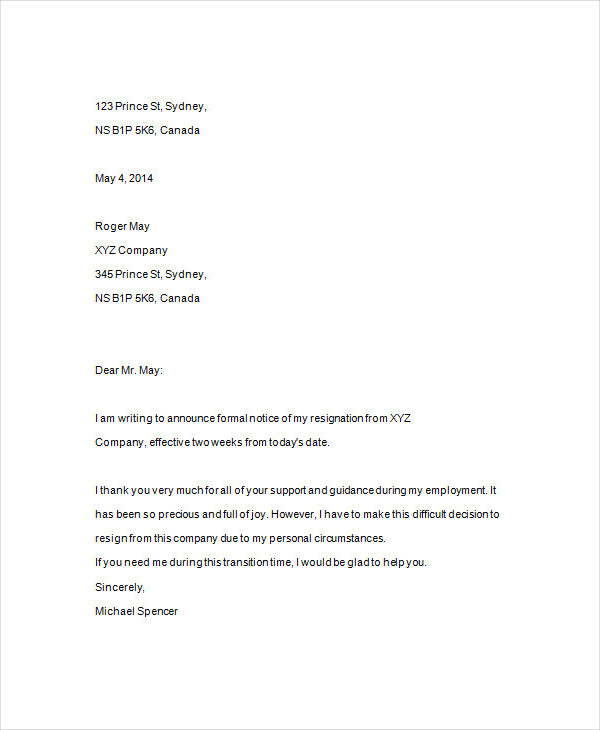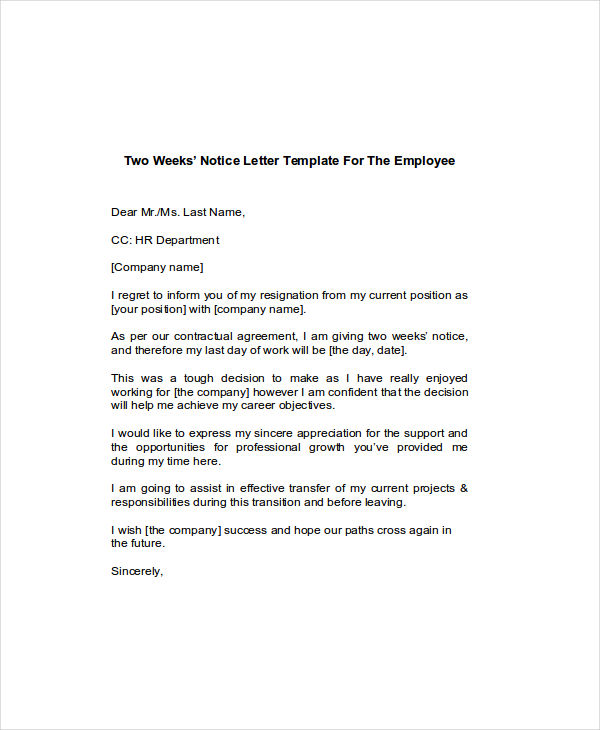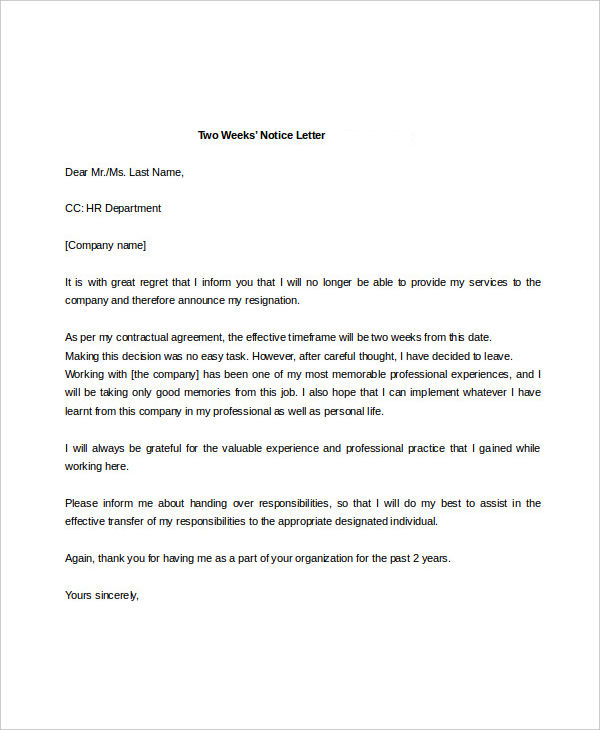6+ Two Weeks Notice Examples to Download
One of the things you will have to do when you want to continue your career somewhere else is to write a two weeks’ notice letter to your employer. The notice to perform would be useful when you want to state the final date that you will be working for that company.
It is recommended that you include an action notice in your two weeks’ notice letter. This can help put things in perspective and help you slowly transition into your next career while helping your past employer find a suitable replacement for your job title.
What is Two Weeks’ Notice?
Two weeks’ notice is a formal declaration made by an employee to their employer, indicating their intention to resign from their current position within two weeks from the date the notice is given. This time frame is traditionally considered as a courtesy to the employer, allowing them sufficient time to find a replacement or to make arrangements for the redistribution of the departing employee’s duties.
Two Weeks Notice Letter Format
Writing a two weeks notice letter is an important step in maintaining professionalism as you transition out of your current job. Here’s a straightforward format to guide you through composing your own resignation letter, ensuring you convey your intentions respectfully and clearly.
Heading
Your Name
Your Address
City, State, Zip Code
Email Address
Phone Number
Date
Inside Address
Employer’s Name
Position
Company Name
Company Address
City, State, Zip Code
Salutation
Dear [Employer’s Name],
Opening Paragraph
Start by stating clearly that you are resigning from your position and include the effective date, which should be two weeks from the date of the letter.
Body Paragraph(s)
- Express Gratitude: Thank your employer for the opportunities you had during your employment. Mention specific experiences or skills you’ve gained.
- Offer Support: Indicate your willingness to help with the transition, such as training a replacement or finishing certain tasks.
Closing Paragraph
Reiterate your thanks and offer any further assistance during the transition period. Keep the tone positive and professional.
Complimentary Close
Sincerely,
Signature
Your Name (typed)
If sending a hard copy, leave space for your handwritten signature above your typed name.
Two Weeks Notice Letter Sample
John Doe
123 Maple Street
Anytown, NY 12345
johndoe@email.com
(555) 123-4567
March 26, 2024
Ms. Jane Smith
Human Resources Manager
XYZ Corporation
456 Oak Avenue
Anytown, NY 12345
Dear Ms. Smith,
I am writing to formally announce my resignation from XYZ Corporation, effective two weeks from today, April 9, 2024. This decision has not been easy and takes into account various personal reasons that require my attention.
I want to express my gratitude for the opportunity to work at XYZ Corporation. I have greatly valued the experiences, challenges, and successes we have shared over the past [number of years/months] and am proud of the work we accomplished together.
During the next two weeks, I am committed to facilitating a smooth transition. I am prepared to assist in training my successor and will ensure that all my responsibilities are up to date before my departure.
Thank you again for the opportunity to be a part of XYZ Corporation. I look forward to staying in touch and hope to cross paths in the future. Please let me know how I can further assist during this transition.
Sincerely,
John Doe
Tips for Writing a Two-Week Notice
When the time comes to move on from your current job, writing a two-week notice letter is a crucial step in the resignation process. This letter not only formalizes your decision to leave but also helps you maintain a positive relationship with your soon-to-be former employer. Here are some essential tips to consider when crafting your two-week notice:
Be Direct and Professional
- Clear Intent: State your resignation clearly at the beginning of the letter. There’s no need for a long preamble.
- Professional Tone: Keep the tone of your letter professional and courteous. This is not the time for complaints or critiques of the company or colleagues.
Give Adequate Notice
- Two Weeks Minimum: As the name suggests, you should give at least two weeks’ notice. If your position is critical, and you can afford the time, offering more notice can be a considerate gesture.
Express Gratitude
- Acknowledgment: Acknowledge the opportunities and experiences you’ve had during your tenure. A simple thank you can go a long way in maintaining a positive relationship.
Offer Assistance During the Transition
- Support: Indicate your willingness to help with the transition, whether through training a successor or wrapping up projects. This shows professionalism and respect for your role and the company.
Keep It Positive
- Positive Tone: Regardless of your reasons for leaving, focus on the positive aspects of your time with the company. A gracious exit is more likely to be remembered than a negative one.
Avoid Detailed Explanations
- Simplicity: Your resignation letter is not the venue for airing grievances or detailing the reasons for your departure. Keep your message straightforward and positive.
Proofread and Edit
- Error-Free: Before submitting your letter, proofread it for any spelling or grammatical errors. A well-written letter reflects well on you as a professional.
Follow Company Protocol
- Company Procedures: If your company has a specific procedure for resignations, make sure to follow it. This might include whom to address your letter to or how to submit it.
Maintain Confidentiality
- Discreet: Share your resignation letter with your employer first before discussing your departure with colleagues. It’s important to control the narrative and timing of your announcement.
Prepare for the Next Step
- Future Plans: While not necessary for the letter, be prepared to discuss your next steps if asked. You can share as much or as little as you feel comfortable with.
Sample Sentence Starters
- “I am writing to formally resign from my position at [Company Name], effective two weeks from this date.”
- “Thank you for the opportunities for professional and personal development that you have provided me during my time at [Company Name].”
- “I am willing to assist in the transition process to ensure a smooth handover of my responsibilities.”
How to Give Two Weeks’ Notice: A Step-by-Step Guide
Giving your two weeks’ notice is a significant step in transitioning from your current job to your next opportunity. To ensure you handle this professionally and maintain good relationships, follow these key points:
- Decide on Your Resignation Date: Before notifying your employer, choose the date you plan to resign, ensuring it provides at least two weeks’ notice from the day you inform them.
- Prepare Your Resignation Letter: Write a formal resignation letter that includes your last day of work, keeping the tone professional and positive. Express gratitude for the opportunity and mention your willingness to help with the transition.
- Schedule a Meeting with Your Supervisor: Request a private meeting with your direct supervisor to discuss your resignation. It’s respectful to inform them before anyone else in the company.
- Deliver Your Resignation Letter Personally: During the meeting, verbally communicate your intention to resign and hand over your resignation letter. Be prepared for any reaction and stay calm and professional.
- Discuss the Transition Plan: Offer your assistance in training a replacement or transitioning your responsibilities to ensure a smooth handover. Be open to negotiating your end date if necessary, within reason.
- Inform Human Resources: After notifying your supervisor, you may need to inform the HR department formally, depending on your company’s policies. They will guide you through the process of your final paycheck, benefits, and other administrative matters.
- Stay Professional Until the End: Maintain your work ethic and professionalism throughout your remaining time at the company. Completing your tasks and leaving instructions for your successor can leave a lasting positive impression.
- Thank Your Colleagues: Before leaving, take the time to thank your colleagues and supervisors for the support and opportunities you’ve received. Networking and maintaining these relationships can be beneficial in the future.
- Update Your Contact Information: Ensure HR and your colleagues have your updated contact information for future references or inquiries.
- Reflect and Prepare for Your Next Role: Use the time after your notice period to reflect on your experiences and how they can apply to your next role. Prepare mentally and professionally for your new beginning.
The Importance of Giving Two Weeks’ Notice
- Professional Courtesy: Giving two weeks’ notice is seen as a professional courtesy. It reflects well on the employee’s character, showing respect for their employer and colleagues by not leaving them in a difficult position.
- Smooth Transition: This period allows for a smoother transition, where the departing employee can help train a replacement or hand over their responsibilities, ensuring that their departure does not negatively impact the company’s operations.
- Maintaining Relationships: Resigning with proper notice helps in preserving positive relationships with former employers and colleagues. These connections can be valuable for future references or networking opportunities.
- Reputation: In many industries, reputations matter. How one leaves a job can be as important as how one performs while on the job. Resigning without notice can lead to a tarnished reputation, making it more difficult to secure future employment.
10+ Notice Letter Samples
- Resignation Notice Letter
- Notice Letter for Job
- Notice Letter for Work
- Notice Letter for Apartment
- Notice Letter for Landlord
- Notice Letter for Employer
- Notice Letter for Moving Out of Apartment
- Notice Letter for Leaving Job
- Notice Letter for Resignation
- Notice Letter for Tenant
- Notice Letter for Employment Termination
- Notice Letter for Meeting Announcement
- Notice Letter for Schedule Changes
- Notice Letter for Safety Violations
Two Weeks Notice Template Example
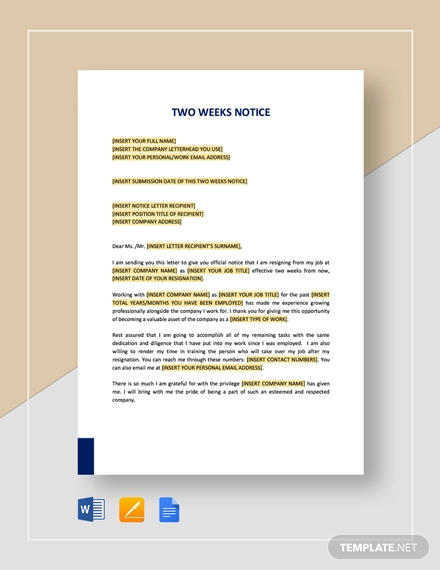
Professional Two Weeks
Short Two Weeks Sample
Formal Two Weeks
Basic Two Weeks Notice
Two Weeks for Resignation Sample
Two Weeks Notice for Job
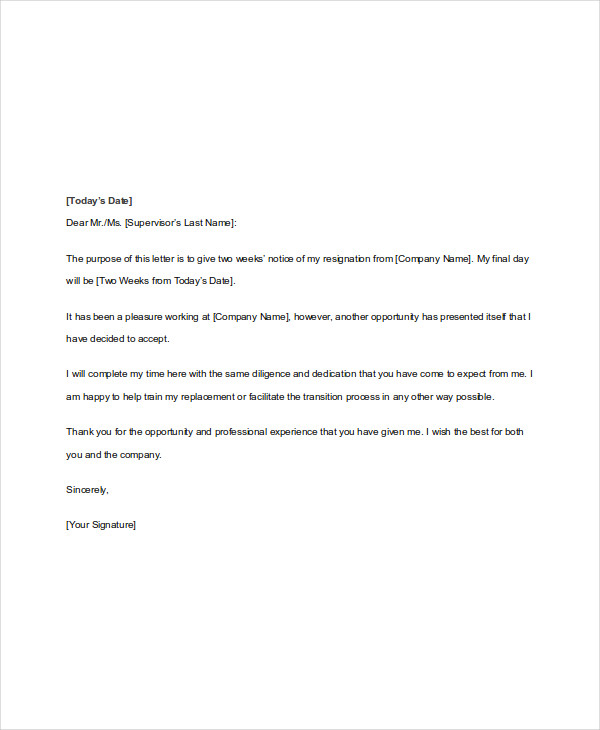
Purpose of a Two Weeks’ Notice
The purpose of a two weeks’ notice is to professionally inform your employer of your resignation notice from your current job and your moving on to your next one. This allows for certain things:
- Your manager is given a period of two weeks to find a suitable and qualified replacement for your job position.
- This also gives you time to say your goodbyes to everyone that you’ve encountered in your workplace.
It is up to you whether you want to offer your help to your manager on finding a replacement for you, but doing so is one way to leave a positive vibe. It is often necessary that you turn over all of your work documents and work responsibilities to the qualified replacement.
Elsewhere on site are downloadable free notice examples that can further assist and guide you on being more well-versed on the purpose of notices in the professional world.
Reasons for a Two Week Notice Letter
- Career Advancement: Moving to a position that offers better career growth opportunities.
- Higher Compensation: Leaving for a job with higher pay or better benefits.
- Relocation: Moving to a different geographical location for personal or professional reasons.
- Work-Life Balance: Seeking employment that offers a better balance between work and personal life.
- Career Change: Transitioning to a different industry or career path.
- Educational Opportunities: Leaving to pursue further education or training.
- Company Culture Fit: Finding a workplace with a culture that better aligns with personal values.
- Health Reasons: Resigning due to health issues that require significant time off or a less demanding job.
- Work Environment: Leaving a toxic or unhealthy work environment.
- Retirement: Deciding to retire from the workforce.
- Personal Reasons: Resigning due to family commitments or other personal obligations.
- Professional Development: Seeking opportunities for professional development not available in the current position.
- Management or Organizational Changes: Changes in management or company direction that don’t align with personal or professional goals
Why should you give two weeks’ notice?
- Maintains Professional Relationships: Leaving on good terms is crucial for maintaining positive relationships with your former employers and colleagues. These connections can be invaluable for future references or networking opportunities.
- Ensures a Smooth Transition: By giving your employer two weeks’ notice, you provide them with enough time to start looking for your replacement or to rearrange current staff duties to cover your responsibilities. This minimizes disruption to the company’s operations.
- Demonstrates Professionalism: Following established workplace norms reflects well on your professional demeanor. It shows that you are considerate of your employer’s needs and are committed to handling your departure as professionally as possible.
- Protects Your Reputation: The manner in which you leave a job can have lasting effects on your professional reputation. Resigning without adequate notice can lead to negative perceptions that may hinder your future employment prospects.
- Offers Time for Knowledge Transfer: Your two weeks’ notice period allows time for you to document your current projects, pass on important information, and potentially train a replacement or colleague on essential tasks, ensuring continuity after your departure.
- Facilitates Closure: This period also gives you and your employer the opportunity to discuss the termination of your employment, including any final payroll details, benefits information, and the return of company property, leading to a cleaner break.
- Respect for Employment Contracts: Some contracts and company policies explicitly require a two-week notice period. Failing to adhere to these terms could result in contractual breaches or forfeiting certain benefits.
- Allows Personal Preparation: This notice period can also be beneficial for you to organize your affairs, such as completing ongoing projects and preparing for your next role, ensuring you’re ready to transition smoothly into your new position.
Is Two Weeks’ Notice Required?
When considering leaving a job, many wonder about the necessity and legality of providing a two weeks’ notice. While it’s a standard practice in many professional settings, whether it’s legally required depends on the circumstances, including your contract and local employment laws. Here are the key points to understand:
Contractual Obligations
- Employment Contracts: If your employment contract specifies a notice period, you are legally obligated to adhere to it. Failure to do so could lead to legal repercussions.
- At-Will Employment: In the United States, many employees work on an at-will basis, meaning either the employer or the employee can terminate the employment relationship at any time, with or without notice. However, providing notice is still considered best practice.
Professional Courtesy and Standards
- Industry Norm: The two weeks’ notice is more about professional courtesy than a legal requirement. It allows your employer time to plan for your departure by starting the search for a replacement or redistributing your workload.
- Reputation: Resigning without notice can harm your professional reputation, potentially affecting future employment opportunities.
Impact on Future Employment
- References: Future employers often contact previous employers for references. Leaving a job on good terms, including providing adequate notice, helps ensure positive feedback.
- Networks: Maintaining professional relationships is crucial in many industries. A respectful departure, including giving two weeks’ notice, helps preserve these connections.
Considerations for Not Giving Notice
- Toxic Work Environment: In situations where the work environment is harmful or abusive, leaving without notice might be necessary for personal well-being.
- Immediate Start Elsewhere: Sometimes, new employment opportunities require an immediate start. Even in these cases, communicating your situation clearly and professionally can mitigate potential negative impacts.
What to Write in a Two Weeks’ Notice
The following are the essential elements to be written in your two weeks’ notice:
- Date of your last working day. This does not only apply to the two weeks’ notice but also to the 30-day notice. This is to give time for your employer to find a new replacement to fill your job position.
- A concise note of gratitude. This gives you a graceful exit while at the same time allowing you to be thankful for the opportunity given to you with your soon-to-be-former employer.
- An offer of help. It is a common courtesy for you to lend your hand in transferring your information and knowledge to your replacement.
FAQs
What Happens in Two Weeks’ Notice?
During the two weeks’ notice period, you continue working while your employer prepares for your departure. This time allows for the handover of duties, training of replacements, and completion of any final projects.
What Not to Say in a Two Weeks’ Notice Letter?
Avoid negative comments about your job, colleagues, or employer. Criticisms, grievances, or unprofessional language can harm future job references and professional relationships.
Should I Give My Two Week Notice on a Friday or Monday?
Giving notice on a Friday allows your employer to process the information and plan for the following week. It also gives you the weekend to prepare for any immediate responses or tasks.
Can a Job Say No to a 2 Week Notice?
Employers cannot refuse a two weeks’ notice. While they may request you stay longer or leave sooner, the decision to work through your notice period is ultimately yours.
What is Silent Quitting?
Silent quitting involves doing the minimum job requirements and disengaging from additional tasks or responsibilities. It reflects a disconnect between employee expectations and their actual job.
Can I Call in Sick During My 2 Weeks Notice?
Yes, you can call in sick if genuinely ill, but it’s important to be professional and considerate about your remaining time. Excessive absences can affect your reputation and references.
Is It Rude to Not Give 2 Weeks Notice?
Not giving a two weeks’ notice can be seen as unprofessional or rude, especially if it leaves the employer without ample time to plan for your departure. However, specific circumstances may justify shorter notice.


